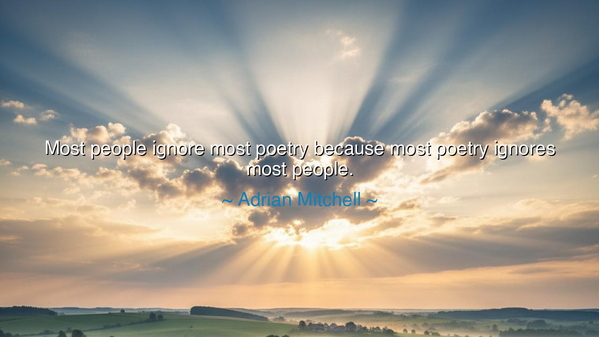
Most people ignore most poetry because most poetry ignores most






Adrian Mitchell, poet of the people, once declared: “Most people ignore most poetry because most poetry ignores most people.” In this simple but cutting truth, he laid bare one of the great tragedies of art: when poetry ceases to speak to the hearts of the many, the many turn their backs on it. For poetry was not born to be locked away in scholarly towers, but to be sung in the marketplaces, to be whispered by lovers, to be carried by workers and children alike. If it forgets this purpose, it becomes a closed door, admired by the few but abandoned by the multitude.
The meaning of Mitchell’s words is both emotional and revolutionary. Poetry, at its best, is the cry of humanity, the song of common life, the mirror of joy and suffering. But too often, it has been dressed in complexity, stripped of warmth, hidden behind intellectual veils. In doing so, it has forgotten the voices of the people. And when poetry ignores them, they, in turn, ignore it. Mitchell reminds us that the bond between art and audience is sacred—and when broken, both are impoverished.
History proves this. In ancient Greece, the poems of Homer were not studied only by scholars; they were sung at festivals, shaping the imagination of an entire civilization. In medieval Europe, the troubadours carried poetry in song across towns and villages, speaking to rich and poor alike. Even in modern times, poets like Pablo Neruda, Langston Hughes, and Maya Angelou gave voice to the struggles and triumphs of the people. They did not write to be obscure; they wrote to be understood. And because they remembered the people, the people remembered them.
Mitchell himself was a warrior for this vision. He believed poetry should belong to everyone, not just the academics or the elite. He performed his poems aloud, often in public spaces, with passion and fire, so that even those who had never opened a book of verse could feel its power. He wrote of love, of injustice, of laughter, of war—subjects that touched ordinary lives. For him, poetry was not a puzzle but a flame. It did not ignore the people; it embraced them.
The lesson here is luminous: if art is to live, it must remain connected to life. Poetry that forgets the people becomes sterile. But poetry that listens, that speaks of their joys and sorrows, that honors their humanity, becomes immortal. The people do not ask for simplicity, but for truth—for words that matter, for language that gives shape to what they already feel in their hearts. When poetry does this, it is no longer ignored; it is cherished.
We must therefore reclaim poetry as our own. Do not wait for scholars to explain it to you. Read aloud the verses that stir you, even if they are simple. Write your own words, for your experiences are worthy of song. Support poets who speak to life, not only to theory. Bring poetry into schools, into streets, into homes, where its flame can warm and guide. In this way, we heal the fracture Mitchell warned of, and return poetry to its rightful place: in the hands of all.
Thus, Adrian Mitchell’s words endure: “Most people ignore most poetry because most poetry ignores most people.” Let us not be among those who ignore, nor among those who forget the people. Let us instead be voices that sing truth in words that can be heard, embraced, and passed down. For poetry belongs not to the few, but to the many—and when it remembers this, it becomes the song of humanity itself.






TTNguyen thi Thuy
Mitchell's quote makes me think about how poetry is often seen as a niche art form. Can poetry be more inclusive without losing its artistic value? How do we make poetry more accessible without stripping it of its depth and complexity? Is there room for poetry to evolve and better reflect the lives of everyday people, or is it simply that poetry, in its essence, will always be misunderstood by many?
DNDanh Nguyen
I think Mitchell’s quote is both a critique and a call to action for poets. Is it fair to blame poetry for being misunderstood, or should we look at how it is communicated? Could poets take more responsibility for making their work resonate with a broader audience, or is the challenge of making poetry relatable more about the readers’ willingness to engage with it? How do we make poetry something people want to embrace in their daily lives?
KQLe Nguyen Khai Quynh
This quote strikes me because it suggests that poetry has become somewhat inaccessible to the general public. But is it really poetry’s fault, or is it the way poetry has been taught or presented? Can poetry evolve in a way that speaks to modern audiences without losing its artistic essence? Is there a way to make poetry feel more personal, immediate, and connected to people’s lives, or do we risk oversimplifying it?
NBPhan Ngoc Bich
Mitchell’s observation about poetry ignoring most people seems to reflect a disconnect between high art and popular culture. Is there a way for poetry to become more approachable without sacrificing its essence or depth? How can poets make their work more engaging for those who might not typically seek out poetry? Would this make poetry more relevant, or is it important for some poetry to remain challenging, even if it means fewer people engage with it?
HNTu Thi Hong Nhan
I wonder if Mitchell is pointing out the gap between traditional poetry and the common experience. What makes most poetry seem so disconnected from people's daily realities? Could poetry be more widely appreciated if it took a more inclusive approach, reflecting a broader range of voices and experiences? How can poets bridge this gap to ensure their work resonates with a larger, more diverse audience, without losing its artistic integrity?